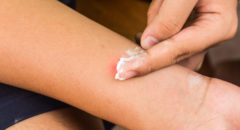
You’ve gotta love the skin you’re in no matter what! Your skin is the largest organ on your body and it serves many purposes. It helps protect your body from various external factors like bacteria, and chemicals and regulates your temperature. So the next time you decide to skip out on skin screen protection for the summer or lotion to get rid of the ashiness, remember this is the organ everyone sees. Not protecting or treating your lovely melanin with care can cause you to age faster or create other health conditions over time.
We often take the skin for granted because when you think about your organs most people would name organs such as the kidneys, lungs, the brain, or the heart but forget about the skin. Yes, your skin is the largest organ covering 16 percent of your overall body mass and storing your water, fat and vitamin D.
Now if you are doing the right things to protect your skin but notice that suddenly it becomes red, itchy and inflamed like a rash you may have eczema. Sometimes many people get baby eczema mixed up with acne but there is a difference. Baby eczema is a common skin condition that affects up to 25% of children and nearly 60% of them develop this skin condition within the first year of their lives. People who have eczema usually have sensitive skin that is easily irritated by certain fabrics, foods, weather conditions, chemicals found in beauty products and soaps.
RELATED: Eczema Can Take a Toll on a Child’s Mental Health
Eczema symptoms can vary but here are the most common conditions you may see on the skin:
- Dry flaky skin
- Red or inflamed patches of skin containing yellow crust or pus.
- Severe bumpy/pimple-like skin accompanied by itchiness
Baby eczema usually appears on the cheeks and the outer sides of the arms and legs. However, it can also appear on your scalp, hands, and feet. Baby eczema can look similar to acne because the red little pimples can break out on the face, chest, neck and back and can be triggered by the oils produced in your skin, your hormones or by being exposed to bacteria on the skin. Excessive heat and sweating, allergens, saliva from drooling, pollen, dust, and pet dander can also trigger eczema or cause your condition to get worse.
Acne is a chronic inflammatory skin condition that affects 50 million Americans yearly and usually occurs during the puberty stage of your life but can also appear at any time during your life. Acne occurs when the oil glands underneath your skin get blocked with your dead skin cells causing build-up to occur and when this happens a pimple develops.
On the other hand, when it comes to acne, this skin condition affects three out of four people ages 11 to 30 years. Acne impacts the oil glands at the base of your hair follicles and when your follicles get blocked the oil glands build up underneath the skin forming a pimple. The good news is acne isn’t contagious but can leave nasty scars on your skin if you tend to pick, squeeze, and pop the pimples that appear on your body.
Researchers say that hormonal changes within your body, such as starting your menstrual cycle, having emotional distress, your genetics, using greasy cosmetics, and your diet can trigger acne breakouts to appear on various parts of your skin.
After you identify what causes your outbreaks then you can
work on treating the acne.
RELATED: Why Treating Acne Correctly is Important for Blacks
Here are a few natural treatments you can try for both baby acne and eczema:
- Eliminate climate dirt, bodily triggers such as sweat and drool from the baby’s skin
- Use fragrance-free cleansers and lotions from your baby’s skin regime
- Limit your baby’s bath time by avoiding hot water, use lukewarm water instead to prevent over-drying out the skin.
- Avoid using laundry detergents, wipes, fabric softeners, soaps and shampoos that contain fragrances and chemicals.
- Consult with your dermatologist to see if topical corticosteroids or ointments can be used to reduce inflammation and itching to provide relief.
- Consider applying mittens to the baby’s hands to prevent excessive scratching, which can worsen the condition.
- Take notice of fabric choices when you are purchasing clothing for yourself and your child. Sometimes the material may irritate the skin causing you to have breakouts.
Just remember baby acne normally will disappear on its own in due time but do not use adult medications on children to address the symptoms because some acne treatments depend on the severity of the condition and may have adverse reactions on a young child’s skin.
For example, many over-the-counter (OTC) medications like steroidal and non-steroidal gels and creams are effective in treating adult acne however these remedies are determined by your skin type. If you have oily skin, using alcohol-based gels is best to dry out and break down blackheads/whiteheads and kill bacteria on the skin.
You can look for the following active ingredients to assist you with this process:
- Benzoyl peroxide
- Retin-A
- Azelaic acid
- Sulfur
- Resorcinol
Both adults and babies with sensitive, delicate and dry skin can benefit from creams to soothe and reduce itching and inflammation. You may want to consider all-natural and unscented ingredients such as Emily Skin Soothers for Itchy Eczema - "Baby & Adult Soother”. This product can be used to treat cradle cap, seborrheic dermatitis and provide relief for rashes and eczema.
Some dermatologists also recommend using the following products to assist you with itching and eczema but before you do, consider consulting with your physician first to make sure these products address your individual needs.
- Aveeno’s Baby Eczema Therapy Moisturizing Cream
- Aquaphor Healing Ointment
- Cetaphil Gentle Skin Cleanser
- CeraVe Skin Renewing Gel Oil
- First Aid Beauty Anti-Redness Serum
Many environmental conditions such as pet dander, pollens, tobacco smoke and dry air can trigger eczema and acne conditions according to the American Academy of Dermatology Association. However, it's best to treat and address these concerns immediately when they first appear to prevent the condition from worsening. If you have a skin condition that reoccurs and you can not easily identify it, don't self-treat. Make an appointment with your dermatologist who can assist you with the best plan of action for your skin.









